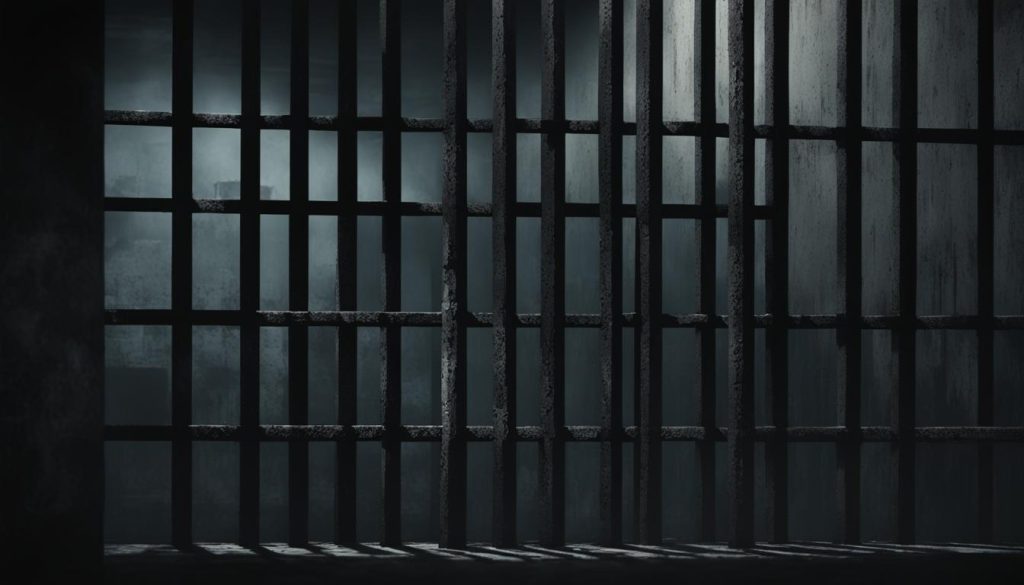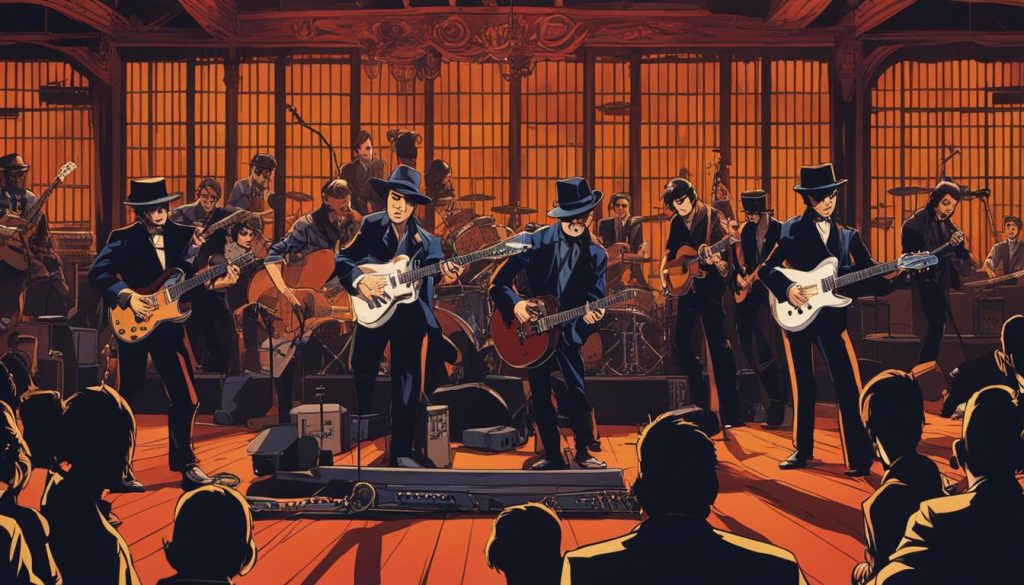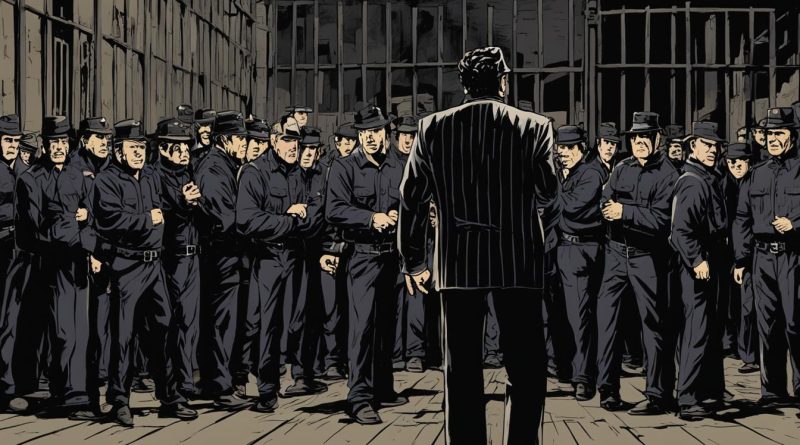Exploring the Legacy of “Folsom Prison Blues”
“Folsom Prison Blues” is more than just a song – it is an enduring legacy that has resonated with listeners for generations. The iconic tune, written and performed by Johnny Cash, paints a raw and emotive picture of life behind bars and the struggle for redemption. Its powerful lyrics and haunting melody have made it a timeless classic that continues to inspire and captivate audiences to this day.
In this section, we will delve into the enduring impact of “Folsom Prison Blues” and explore its lasting legacy. From its origins as a reflection of Cash’s own experiences performing in prisons to its influence on popular culture, we will examine the song’s societal significance and the ways in which it has transcended time.
Key Takeaways
- “Folsom Prison Blues” is a timeless classic that has resonated with listeners for generations.
- The song reflects Cash’s own experiences performing in prisons and addresses themes of redemption and resilience.
- The enduring impact of “Folsom Prison Blues” has been reflected in its influence on popular culture.
- The song has become an integral part of American music history and its legacy as an emotive depiction of the human experience transcends time.
The Origins and Significance of “Folsom Prison Blues”
The story behind “Folsom Prison Blues” has deep roots in the personal experiences of Johnny Cash. As a young man, he witnessed the harsh realities of prison life while serving in the United States Air Force in Germany. Cash’s empathy for inmates he met there would later play a role in the creation of his signature song.
According to Cash, he was inspired to write the song after watching the film Inside the Walls of Folsom Prison. The movie depicted the tragic realities of life behind bars, leading Cash to question the fairness of the penal system. His reaction, coupled with his earlier experiences, provided the inspiration for the lyrics of “Folsom Prison Blues.”
The song’s significance also extends beyond Cash’s inspiration. Its release in 1955 marked a turning point in his career, propelling him to fame and cementing his position as an icon of American popular music. More than that, “Folsom Prison Blues” tapped into a deep vein of empathy in America’s collective consciousness, giving voice to the struggles of those trapped in the prison system.
Moreover, the song’s portrayal of prison life and its societal impact cannot be overstated. It shed light on the bleak conditions faced by inmates and called for a more compassionate approach to criminal justice. In many ways, “Folsom Prison Blues” was ahead of its time, anticipating the broader push for prison reform that would later emerge in American culture.

Johnny Cash’s Prison Performances
| Event | Date | Prison |
|---|---|---|
| First Prison Performance | 1957 | Huntsville State Prison, Texas |
| First Folsom Prison Performance | 1968 | Folsom State Prison, California |
| San Quentin Prison Performance | 1969 | San Quentin State Prison, California |
Adding to the song’s impact, Cash himself became a frequent performer at prisons across the US, using his platform to raise awareness for the struggles of inmates and advocate for reform. These performances often featured “Folsom Prison Blues” as a centerpiece, underscoring the song’s deep resonance with audiences.
In sum, “Folsom Prison Blues” represents a powerful marriage of musical talent and social consciousness. Its origins in Johnny Cash’s personal experiences, combined with its impact on American culture, make it a standout moment in music history.
The Cultural Impact and Adaptations of “Folsom Prison Blues”
Over the years, “Folsom Prison Blues” has had a significant cultural impact, extending far beyond the music world. From its inclusion in films and TV shows to covers by other musicians, the song has left an indelible mark on popular culture.
The song has been adapted and covered by countless artists from different genres, transcending the boundaries of country music. Artists such as Bob Dylan and Elvis Presley have had their own renditions of the song, and its influence can be heard in the music of modern-day musicians such as The Lumineers and Mumford & Sons.

Outside of the music industry, “Folsom Prison Blues” has also made its way onto the big and small screens, with the song being featured in a number of films and TV shows. Notably, it was prominently referenced in the hit prison drama series “Orange is the New Black.” The song’s portrayal of the harsh realities of the prison system has made it a powerful commentary on societal issues beyond just music.
“When I was young, I heard ‘Folsom Prison Blues’ on the radio and it was like somebody had turned a light on in my head.” – Bruce Springsteen
Conclusion
Reflecting on the enduring impact of “Folsom Prison Blues” reveals it as a timeless masterpiece that continues to captivate audiences with its raw and heartfelt depiction of life behind bars. Its legacy as a symbol of resilience, redemption, and the human experience remains unrivaled. It is an integral part of American music history, cherished by generations of fans.
The song’s significance within the context of Johnny Cash’s career cannot be overstated. Not only did it cement his status as a country music legend, but it also showcased his empathy for marginalized communities and his willingness to tackle challenging themes. It was a song that resonated with audiences on a personal level, addressing a subject that many people could relate to.
As a cultural phenomenon, “Folsom Prison Blues” has been adapted in various ways, showcasing its influence on popular culture. From covers by other musicians to references in films, TV shows, and literature, the song has permeated the media landscape for decades, further solidifying its place in music history.
In conclusion, “Folsom Prison Blues” has a legacy that will endure for generations to come. It is a song that has stood the test of time and continues to inspire and connect with people, making it an essential part of American music culture. Its enduring impact on music, society, and popular culture is a testament to its status as an iconic masterpiece.
FAQ
What is the enduring impact of “Folsom Prison Blues”?
“Folsom Prison Blues” has had a lasting impact on American music history. The song’s raw portrayal of incarceration and redemption has resonated with audiences for decades, solidifying it as a timeless masterpiece.
What are the origins of “Folsom Prison Blues”?
“Folsom Prison Blues” was written and recorded by Johnny Cash in 1955. The song was inspired by Cash’s own experiences performing at prisons and reflects the struggles and emotions of those behind bars.
How has “Folsom Prison Blues” influenced popular culture?
“Folsom Prison Blues” has had a significant cultural impact. The song has been covered by numerous musicians and has been featured in films, TV shows, and literature, solidifying its place in pop culture as an iconic and influential piece of work.
Why is “Folsom Prison Blues” considered a cultural phenomenon?
“Folsom Prison Blues” is considered a cultural phenomenon due to its enduring popularity and its ability to connect with listeners on a deep emotional level. The song’s themes of resilience, redemption, and the human experience make it a timeless and powerful piece of American music history.
